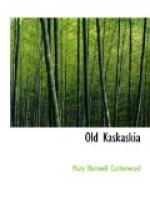They entered the shop, while the slave led the horse away; and no customers demanding the trading friar’s attention, he followed his lodger to an inner room, having first lighted candles in his wooden sconces. Their yellow lustre showed the tidiness of the shop, and the penny merchandise arranged on shelves with that exactness which has been thought peculiar to unmarried women. Father Baby was a scandal to the established confessor of the parish, and the joke of the ungodly. Some said he had been a dancing-master before he entered the cloister, and it was no wonder he turned out a renegade and took to trading. Others declared that he had no right to the gray capote, and his tonsure was a natural loss of hair; in fact, that he never had been a friar at all. But in Kaskaskia nobody took him seriously, and Father Olivier was not severe upon him. Custom made his harlequin antics a matter of course; though Indians still paused opposite his shop and grinned at sight of a long-gown peddling. His religious practices were regular and severe, and he laid penance on himself for all the cheating he was able to accomplish.
“I rode down from Elvirade with Governor Edwards,” said the doctor. “He and all Kaskaskia appear to be going to Colonel Menard’s to-night.”
“Yes, I stood and counted the carriages: the Bonds, the Morrisons, the Vigos, the Sauciers, the Edgars, the Joneses”—
“Has anything happened these three days past?” inquired the doctor, breaking off this list of notable Kaskaskians.
“Oh, many things have happened. But first here is your billet.”
The young man broke the wafer of his invitation and unfolded the paper.
“It is a dancing-party,” he remarked. His nose took an aquiline curve peculiar to him. The open sheet, as he held it, showed the name of “Dr. Dunlap” written on the outside. He leaned against a high black mantel.
“You will want hot shaving-water and your best ruffled shirt,” urged the friar.
“I never dance,” said the other indifferently.
“And you do well not to,” declared Father Baby, with some contemptuous impatience. “A man who shakes like a load of hay should never dance. If I had carried your weight, I could have been a holier man.”
Dr. Dunlap laughed, and struck his boot with his riding-whip.
“Don’t deceive yourself, worthy father. The making of an abbot was not in you. You old rascal, I am scarcely in the house, and there you stand all of a tremble for your jig.”
Father Baby’s death’s-head face wrinkled itself with expectant smiles. He shook off his wooden shoes and whirled upon one toe.
The doctor went into another room, his own apartment in the friar’s small house. His office fronted this, and gave him a door to the street. Its bottles and jars and iron mortar and the vitreous slab on which he rolled pills were all lost in twilight now. There were many other doctors’ offices in Kaskaskia, but this was the best equipped one, and was the lair of a man who had not only been trained in Europe, but had sailed around the entire world. Dr. Dunlap’s books, some of them in board covers, made a show on his shelves. He had an articulated skeleton, and ignorant Kaskaskians would declare that they had seen it whirl past his windows many a night to the music of his violin.




